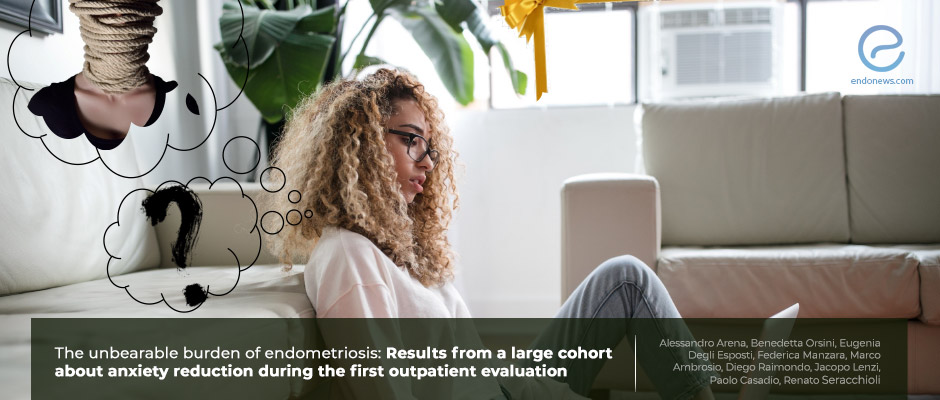Medical Examination Reduces Anxiety in Women With Suspected Endometriosis
Aug 6, 2021
Accurate and personalized counselling should therefore be provided to women with suspected endometriosis to reduce their distress.
Key Points
Highlights:
- Anxiety levels are reduced after medical examination in women with suspected endometriosis.
Importance:
- Based on this finding, tailored counseling is essential to improve the psychological wellbeing of women suspected of having endometriosis.
What's done here:
- Researchers conducted a prospective observational study on 104 women with suspected endometriosis who filled out questionnaires for anxiety about their health status before and after medical examination.
Key results:
- Anxiety levels decreased after the medical examination.
- The most pronounced decrease was observed in women with higher baseline levels of anxiety, those who searched information online, and those for whom endometriosis was not confirmed.
- The decrease in anxiety levels was mild in women who were put on a waiting list for surgery.
- Almost all patients were satisfied with the visit and the mood of most of them improved following the visit.
Limitations:
- This is a single-center study and the results might not reflect what is happening in general.
- Different gynecologists examined the women, which could have an influence on the results.
- In around a third of women, endometriosis was not confirmed, possibly underestimating the real incidence of the disease in the study population.
- Some women may have other diseases than endometriosis, which could add a bias to the analysis.
- There was a weak correlation between pre-and post-evaluation STAI-Y6 scores, which could lead to inaccurate conclusions.
Lay Summary
Anxiety levels go down after medical examination in women with suspected endometriosis, found a study by Italian researchers that was published in the Journal of Psychosomatic Research. This was especially pronounced in women who had higher baseline distress and who sought information online.
“To create a trustful relationship with women, providing them with tailored counseling, seems essential to improve their psychological wellbeing,” wrote Alessandro Arena and the co-authors of the study.
Their aim was to evaluate the impact of the first outpatient visit on the levels of anxiety in women with suspected endometriosis and to identify individual characteristics that had the greatest influence on distress levels.
They, therefore, conducted a prospective observational study in 104 women with suspected endometriosis who were referred to their academic center between January 2019 and March 2020.
Before the visit, the women completed the Generalized Anxiety Disorder-7 (GAD) and the Spielberg State-Trait Anxiety Inventory (STAI) Y6 questionnaires. After the visit, they completed the STAI-Y6 questionnaire again as well as the Patient Global Impression of Improvement (PGII) questionnaire. The researchers also evaluated both the patients’ and the physicians' satisfaction with the visit using a five-point scale.
They found that the women’s anxiety levels significantly decreased after the visit. The decrease was most pronounced in women who had higher anxiety to start with, those who had sought information online, and those in whom endometriosis was not confirmed.
However, anxiety levels only decreased mildly in women who were put on a waiting list for surgery, suggesting that surgery is a major source of distress for patients.
Most patients’ mood improved following the visit and almost all of them were satisfied with the visit.
“Anxiety levels are reduced after medical examination in women with higher baseline distress and who sought information online”, the researchers concluded. They added that further studies are needed to better understand the exact role and implications of anxiety in patients with endometriosis, especially during the first outpatient evaluation.
Research Source: https://pubmed.ncbi.nlm.nih.gov/34020342/
anxiety medical examination suspected endometriosis quality of life satisfaction trust counseling wellbeing psychological

